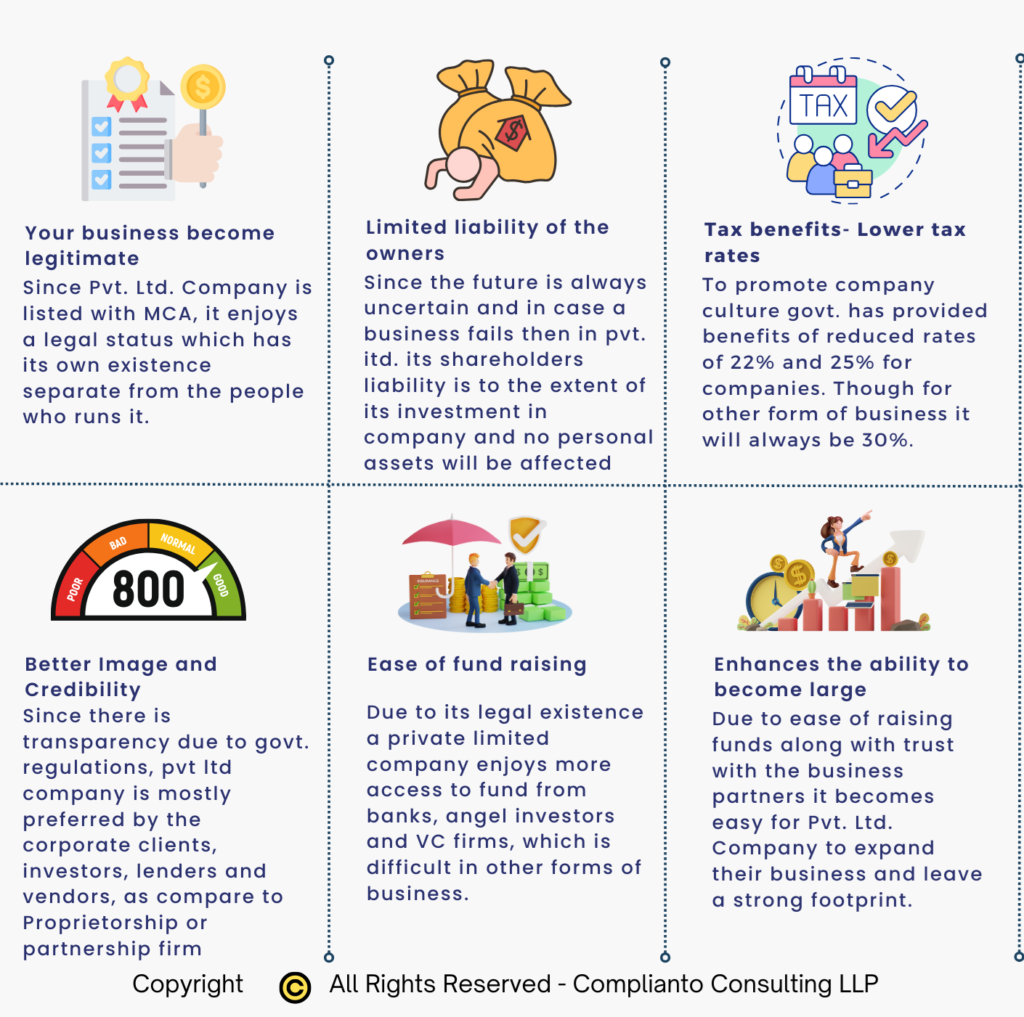To position your company for substantial growth and ample expansion opportunities in the future, structuring it under the private limited model stands out as the optimal choice. This discussion will delve into the diverse advantages of incorporating a private limited company.
What is a Private Limited (Pvt Ltd) Company?
Small to medium-sized enterprises (SMEs) and startups frequently adopt the business structure of a Private Limited Company. This legal entity operates under the regulations outlined in the Companies Act or equivalent legislation of the relevant country. Within a Private Limited Company, ownership is distributed through shares. Shareholders are not individually responsible for the company’s debts beyond their contributions to the share capital. This framework presents numerous advantages and benefits for businesses, rendering it a favored selection among entrepreneurs. Now, let’s delve into the detailed advantages of a private limited company.
Minimum Requirement of a Private Limited Company
To set up and run a Private Limited Company, specific minimum criteria must be fulfilled. These requirements may differ from one country to another. Common prerequisites encompass:
- Minimum Director Requirement: Typically, a minimum of two directors is necessary, with one of them being a resident of the country where the company is being registered.
- Minimum Shareholder Requirement: A Private Limited Company is mandated to have a minimum number of shareholders, often ranging from two to a maximum of 200 shareholders.
- Registered Office: The company must possess a registered office address located within the country of its incorporation.
- Name Reservation: The intended name for the company should be distinctive and should not infringe on existing trademarks or businesses.
- Paid-up Share Capital: While there is usually no specific stipulation for a minimum paid-up share capital, certain countries might have nominal requirements.
- Mandatory Compliances: Running a Private Limited Company involves complying with various laws and regulations like GST, Income Tax, ROC Mandatory Compliances, Balance Sheet Audit, PF & ESI.
Advantages of Private Limited Company

Advantages of Private Limited (Pvt Ltd) Companies offer several, including:
- No Compulsory Minimum Paid-up Capital: In many countries, Private Limited Companies are not obliged to maintain a minimum paid-up capital. It facilitates accessibility for startups and small businesses.
- Distinct Legal Entity: A Private Limited Company possesses its own legal identity, separate from its shareholders. It safeguards shareholders’ personal assets in the event of business liabilities.
- Limited Liability of Members: Shareholders bear limited liability, restricted to the amount invested in the company, shielding their personal assets from business-related debts and obligations.
- Capital Mobilization: Issuing shares enables Private Limited Companies to raise capital from investors, simplifying the process of attracting investments and expanding the business.
- Continual Existence: The company endures irrespective of changes in shareholders, ensuring stability and longevity for the business.
- Foreign Direct Investment (FDI): The well-defined legal structure and limited liability of Private Limited Companies often attract foreign investors and foreign direct investment (FDI).
- Enhanced Credibility: The organizational structure of a Private Limited Company bolsters credibility and trustworthiness among customers, suppliers, and investors.
- Effortless Share Transferability: Shares in a Private Limited Company can be transferred or sold with relative ease, providing liquidity for shareholders.
- Property Ownership: A Private Limited Company holds the capability to own property, engage in contracts, and conduct business activities under its own name.
- Dual Roles: Directors and shareholders can assume dual roles within the company, facilitating effective management and control.
- Borrowing Capacity: Private Limited Companies have the ability to secure funds from banks and financial institutions based on their assets and financial standing.
- Legal Standing: A Private Limited Company can initiate legal action or be subject to legal proceedings in its own name, ensuring legal protection for its interests.
Entrepreneurs seeking to establish a well-structured and liability-limited business entity often favor the benefits offered by Private Limited Companies.
FAQs on Private Limited Company
1. How private company is better than public company?
The superiority of private companies over public companies is often acknowledged in certain aspects owing to their unique characteristics. Some advantages of private companies compared to public companies include:
Control: Owners wield greater influence over decision-making and operational aspects. Privacy: Private companies face less stringent reporting requirements and can maintain confidentiality regarding financial information.
Flexibility: Private companies can prioritize long-term growth without the constraints of meeting quarterly earnings expectations.
Stability: Private ownership fosters stability, as it is not susceptible to fluctuations in stock prices.
Fewer Regulatory Obligations: Private companies contend with fewer regulatory and compliance demands. Nevertheless, the decision between opting for a private or public company hinges on specific business goals and prevailing circumstances.
Can one person own a private limited company?
Certainly, in numerous countries, including India, an individual can own and manage a Private Limited Company, commonly known as a One Person Company (OPC). OPCs are legal entities tailored to suit sole entrepreneur. It offers limited liability and legal segregation between the proprietor and the business.
What are the characteristics/features of a private limited (Pvt Ltd) company?
Characteristics commonly associated with a Private Limited Company encompass limited liability, distinct legal entity status, a capped number of shareholders (typically up to 200), limitations on share transfer, perpetual existence, and the capacity to secure funds through the issuance of equity shares.
Can one person open a Pvt Ltd company in India?
Yes, in India, a single individual can establish a Private Limited Company. It is commonly referred as a One Person Company (OPC). The concept of OPC allows a sole entrepreneur to own and operate a private company, enjoying limited liability and legal separation between themselves and the business.
How does private limited companies work?
Private Limited Companies operate as independent legal entities under the Companies Act. To establish one, individuals must obtain Digital Signatures, Director Identification Numbers, and register with the Registrar of Companies (ROC). With ownership structured through shares, these companies can have up to 200 shareholders, enjoying limited liability.
Management is carried out by directors appointed by shareholders. Financial compliance, including annual filings and audits, is crucial, and shares can be issued and transferred with certain restrictions. Private Limited Companies have perpetual existence, ensuring continuity despite changes in ownership.
They can raise funds through equity shares and often attract foreign investors due to their legal structure and limited liability. Adherence to these aspects ensures the effective functioning of Private Limited Companies.
How many employees are required for Pvt Ltd?
In many jurisdictions, including India, there is no specific minimum requirement for the number of employees to establish a Private Limited Company. The process of forming a Private Limited Company primarily involves meeting certain statutory requirements related to the number of directors and shareholders, rather than a specific employee count. Private Limited Companies are more focused on their ownership structure, governance, and compliance with company law.
The number of employees a company hires typically depends on its business operations, scale, and growth plans. It is independent considerations from the initial formation of the Private Limited Company. It’s essential to comply with applicable labor laws and regulations concerning employment once a company begins hiring staff.
How does the ability to raise funds through equity shares impact the growth of Private Limited Companies in India?
Private Limited Companies can attract investments and foster growth by issuing equity shares. This flexibility in fundraising allows them to raise capital for expansion and development without relying solely on debt.
What are the key advantages of opting for a Private Limited Company structure in India?
Private Limited Companies in India offer advantages such as limited liability, separate legal entity status, ease of fund raising, and enhanced credibility. The structure allows for effective control by owners and flexibility in decision-making.
Advantage of Private Limited Company over LLP?
The choice between a Private Limited Company (PLC) and a Limited Liability Partnership (LLP) in India depends on various factors, and each structure has its own set of advantages. Here are some advantages of a Private Limited Company over an LLP:
- Limited Liability: In a Private Limited Company, shareholders’ liability is limited to the amount unpaid on their shares. It provides a crucial layer of protection for personal assets. LLPs also offer limited liability, but the extent is different.
- Ease of Fundraising: Private Limited Companies can easily raise funds by issuing equity shares. This makes it more attractive for investors compared to LLPs, which have restrictions on equity participation.
- Perpetual Existence: A Private Limited Company enjoys perpetual existence. It means its existence is not affected by changes in ownership or the departure of shareholders. LLPs may face dissolution in case of certain events.
- Credibility and Trust: Private Limited Companies often carry more credibility in business transactions. The structured legal framework and corporate image contribute to enhanced trust among customers, suppliers, and investors.
- Transferability of Shares: Shares in a Private Limited Company are easily transferable, providing liquidity to shareholders. LLPs have limitations on the transfer of partnership interests.
- Employee Stock Options (ESOPs): Private Limited Companies can implement ESOPs, allowing employees to acquire shares in the company. This is a common practice for attracting and retaining talent.
- Statutory Audit Requirements: Private Limited Companies are subject to mandatory statutory audits, which can enhance transparency and financial reporting. LLPs have more flexibility in this regard.
- Legal Framework: The legal framework for Private Limited Companies is well-established and recognized globally. This can be advantageous for businesses engaged in international transactions.
While Private Limited Companies offer these advantages, LLPs have their own benefits, such as greater flexibility in management, ease of compliance, and fewer regulatory formalities. The choice between a Private Limited Company and an LLP should be based on the specific needs, goals, and nature of the business. It’s advisable to seek professional advice before making a decision.



